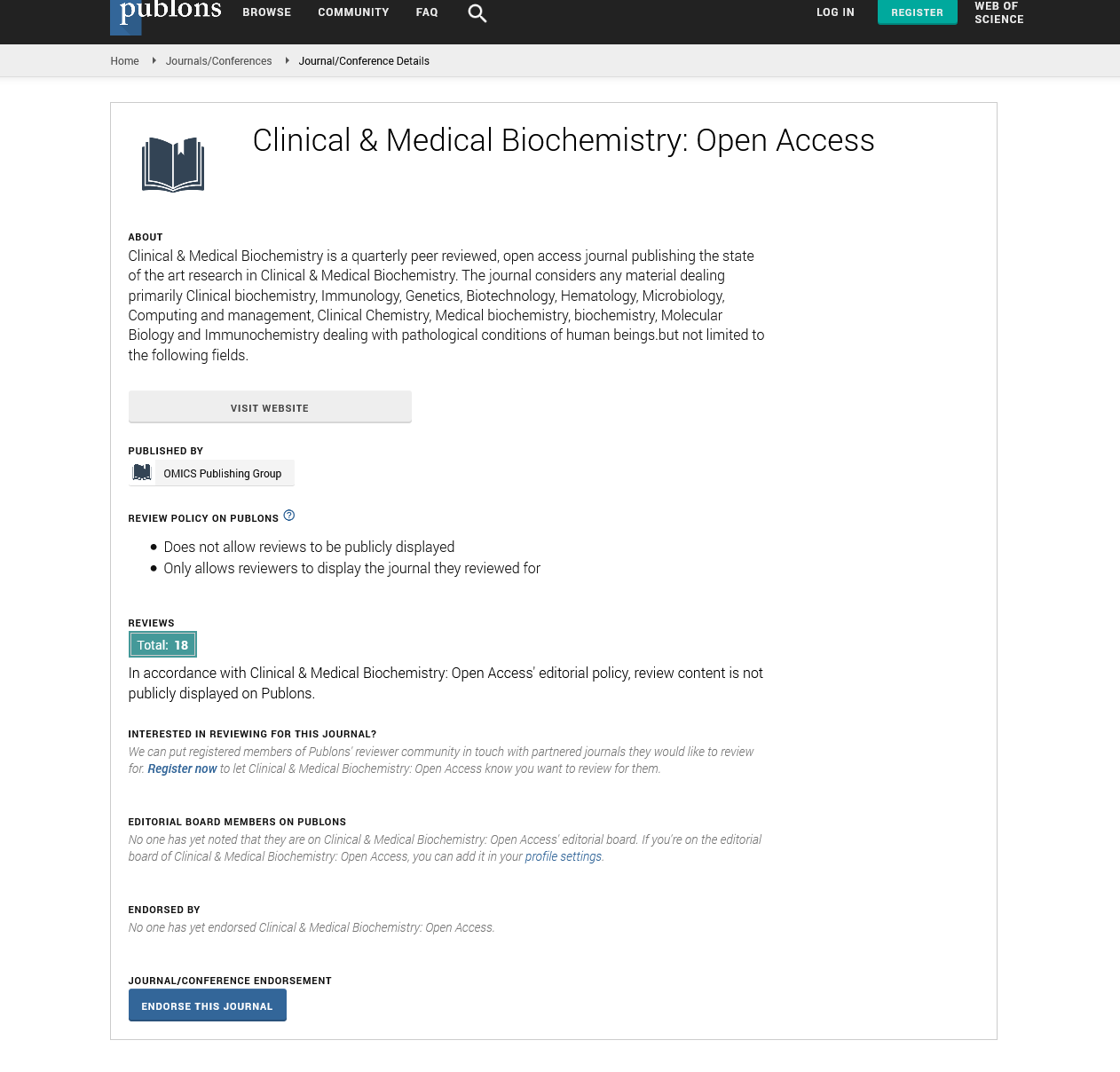Indexed In
- RefSeek
- Directory of Research Journal Indexing (DRJI)
- Hamdard University
- EBSCO A-Z
- OCLC- WorldCat
- Scholarsteer
- Publons
- Euro Pub
- Google Scholar
Useful Links
Share This Page
Journal Flyer

Open Access Journals
- Agri and Aquaculture
- Biochemistry
- Bioinformatics & Systems Biology
- Business & Management
- Chemistry
- Clinical Sciences
- Engineering
- Food & Nutrition
- General Science
- Genetics & Molecular Biology
- Immunology & Microbiology
- Medical Sciences
- Neuroscience & Psychology
- Nursing & Health Care
- Pharmaceutical Sciences
Opinion Article - (2024) Volume 10, Issue 1
Clinical Laboratories and their Significance in the Current Healthcare Sector
James Parker*Received: 22-Dec-2023, Manuscript No. CMBO-24-24545; Editor assigned: 26-Dec-2023, Pre QC No. CMBO-24-24545 (PQ); Reviewed: 10-Jan-2024, QC No. CMBO-24-24545; Revised: 17-Jan-2024, Manuscript No. CMBO-24-24545 (R); Published: 24-Jan-2024, DOI: 10.35841/2471-2663.23.10.206
Description
Clinical laboratories are essential locations where the complex procedures of medical diagnostics are brought to life in the world of contemporary healthcare. By performing several tests and examination, these specialist facilities act as the central nervous system of the healthcare system, offering vital insights into the health of their patients. Investigating the inner workings of clinical laboratories reveals the vital role that they play in determining the parameters surrounding medical decisionmaking. Clinical laboratories, often placed away from the spotlight, are dynamic environments where highly skilled professionals, including medical technologists, pathologists, and laboratory scientists, collaborate seamlessly. These professionals form the backbone of the diagnostic process, methodically conducting a diverse range of tests on various biological samples such as blood, urine, and tissues. The results generated within these laboratory walls serve as the foundation for accurate disease diagnosis, monitoring of treatment effectiveness, and the overall assessment of a patient's health status.
Testing for medical disorders in order to help find and know them is one of the main purposes of clinical laboratories. Regular blood counts and cholesterol checks to more intricate examinations like genetic testing and molecular diagnostics are all included in this broad range of procedures. Informed decisions regarding patient care, treatment strategies, and the prevention of potential health problems are made possible by the test findings acquired by healthcare providers. Clinical laboratories are equipped with advanced technologies and contemporary instruments that facilitate precise and efficient testing. Automated analyzers, mass spectrometers, and Polymerase Chain Reaction (PCR) machines are just a few examples of the sophisticated tools employed in these laboratories. The integration of these technologies not only enhances the accuracy of test results but also contributes to the speed at which acute information is delivered to healthcare providers.
The scope of clinical laboratory testing extends far beyond diagnosing diseases. These laboratories also play an essential role in monitoring ongoing treatments and assessing the effectiveness of prescribed interventions. For individuals with chronic conditions such as diabetes, regular monitoring of blood glucose levels is vital for adjusting medication doses and maintaining optimal health. Similarly, cancer patients undergoing chemotherapy rely on laboratory tests to gauge the response of their tumors to treatment, guiding oncologists in refining therapeutic strategies. In addition to diagnosis and monitoring, clinical laboratories are instrumental in the world of preventive medicine. Screening tests, such as mammograms, pap smears, and Prostate-Specific Antigen (PSA) tests, are conducted to detect potential health issues before symptoms manifest. Early detection of conditions like cancer significantly increases the chances of successful treatment and improved patient outcomes. Thus, clinical laboratories contribute significantly to preventive healthcare initiatives, emphasizing the importance of regular check-ups and screenings.
The significance of clinical laboratories is further underscored in the context of infectious disease management. Especially relevant in times of global health emergencies, laboratories play an important role in the identification and surveillance of infectious agents. During outbreaks, rapid and accurate testing is absolute for tracking the spread of diseases, implementing control measures, and protects public health. Clinical laboratories, therefore, serve as essential components of the healthcare system's resilience in the face of emerging infectious threats. Beyond their diagnostic functions, clinical laboratories are integral to medical research and the advancement of scientific knowledge. Researchers often collaborate with these laboratories to conduct studies, validate new diagnostic methods, and explore novel treatments. The data generated within these laboratories contribute to the broader kind of diseases, clearing the path for innovations in medical science and improved patient care.
Conclusion
In conclusion, clinical laboratories are the people who remain unnoticed of healthcare, driving the engine of medical diagnostics and contributing significantly to the well-being of individuals and communities. Through a countless of tests and analyses, these laboratories provide important information needed for accurate diagnosis, treatment monitoring, and preventive healthcare. Equipped with modern technologies, the committed experts working at these facilities are a powerful force against challenges presented by a range of medical disorders. We must acknowledge respect and admire the vital part that clinical laboratories play in the pursuit of the best possible patient care and the progress of medical science as we explore the complicated environment of healthcare.
Citation: Parker J (2024) Clinical Laboratories and their Significance in the Current Healthcare Sector. Clin Med Bio Chem. 10:206.
Copyright: © 2024 Parker J. This is an open-access article distributed under the terms of the Creative Commons Attribution License, which permits unrestricted use, distribution, and reproduction in any medium, provided the original author and source are credited.

